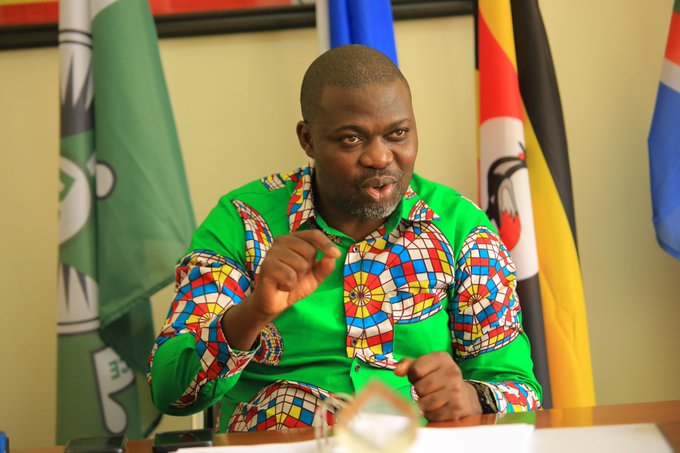Thousands of pilgrims on Sunday January 29th, thronged the birthplace of Uganda Martyr St. Yowana Maria Muzeeyi Kiwanuka at Minziiro Kiraya village in Kyebe sub county, Nazareth Parish in Kyotera district for a holy annual pilgrimage
The Pilgrimage started with a celebration of a holy mass led by the Bishop of Masaka Rt. Rev. Severus Jjumba.
While giving his homily, Bishop Jjumba cautioned parents on providing lunch to learners which he said it should be a necessity in all schools. He said, he will not accommodate any student in Masaka Diocesan founded schools whose parent hasn’t catered for school meals
“Government owns a few schools around though it helps us to pay salaries to teachers in government aided schools. So wherever you find a school at any Paris, it’s owned by the Diocese. We therefore, not listen to parents who fail to pay just a small amount to provide lunch to learners just because they think government will provide every requirement to learners.” The bishop said.

The Bishop of Masaka also advised pilgrims to know the meaning of pilgrimage and emulate St. Yowana Maria Muzeyi whose character was exemplary to believers.
Muzeeyi was executed at the order of King Mwanga of Uganda for being a baptized Christian, one of many in the royal court slain in this persecution. John was canonized in 1964 and become a Uganda Martyr as Saint Yowana Maria Muzeeyi.
St. Yowana Maria Muzeeyi is among the three Uganda Martyrs born in Masaka region. The other two are St. Bruno Sserunkuuma and St. Charles Lwanga. Their places of birth were declared by Masaka catholic National spiritual tourism centers.

About St Yowana Maria Muzeyi
Muzeeyi, a member of the Buffalo (Mbogo) Clan, was born in the hamlet of Kisomberwa, near Minziiro, in Buddu County, between the years 1852 and 1857. Muzeeyi’s father, Bunyaga, held a royal appointment as Shoulder-Bearer to the Kabaka for the County of Buddu. His duty was to carry the Kabaka on his shoulders when necessary during a royal progress through the county-a task that, in a country as abundantly blessed with swamps as Buganda, can have been no sinecure.
Muzeeyi’s mother, a member of the Monkey (Nkima) Clan, was known as Mukatunzi or Nnamalayo.
Muzeeyi himself seems to have been blessed with a whole series of different names. Originally called Musoke, he became known at court as Muddembuga, meaning, one is told, someone-has-refused-to-obey-you-so-go-to-the-chief-to-settle-the-matter. Later, because of his prudence and maturity of judgment, and because an eye affliction, probably trachoma, made him look older than his years, his friends called him Muzeeyi, a name derived from the Swahili word mzee, old man, grandfather.
He was 30-35 years of age at the time of his martyrdom. He was given the name MUZEEYI because he was exceptionally genius and an excellent adviser. His advice was like that of an experienced old man of about 60 years of age.
When he became a Muslim, he was known as Jamari (Good Luck). One wonders whether he himself hailed with relief the touch of genius shown by Pere Lourdel in christening him Jean-Marie, so that the sound, if not the spelling, of his name might remain unchanged.
When Muzeeyi was still quite young, a sub-chief named Kabega, proceeding on transfer from Ggomba to a new post at Seguku, saw him herding cattle and promptly kidnapped him. On arriving at the capital, he sold the boy to an acquaintance named Bigomba who in turn sold him to the Kabaka for a piece of cloth and a gourd of beer.
Still too young to become a page, the lad was entrusted to Ttamiro, the royal fence-maker, in whose household he lived, probably for some time, since many believed Ttamiro to be his father. When he was considered old enough, he became one of the royal pages and, probably at the time when his royal master was showing leanings towards that religion, a Muslim.

When the plague epidemic broke out in 1881, Muzeeyi was granted leave of absence from the Court and went to stay at Mutundwe where he got to know some Christians or catechumens who gave him his first lessons in the Catholic faith.
It was probably on his return from this spell of leave that he joined the group of pages under Joseph Mukasa and quickly endeared himself to that young leader by his thirst for knowledge of the faith. He soon became Joseph’s right-hand man, both in attendance on the sick Kabaka and in the spread¬ing of Christian knowledge amongst the pages.





